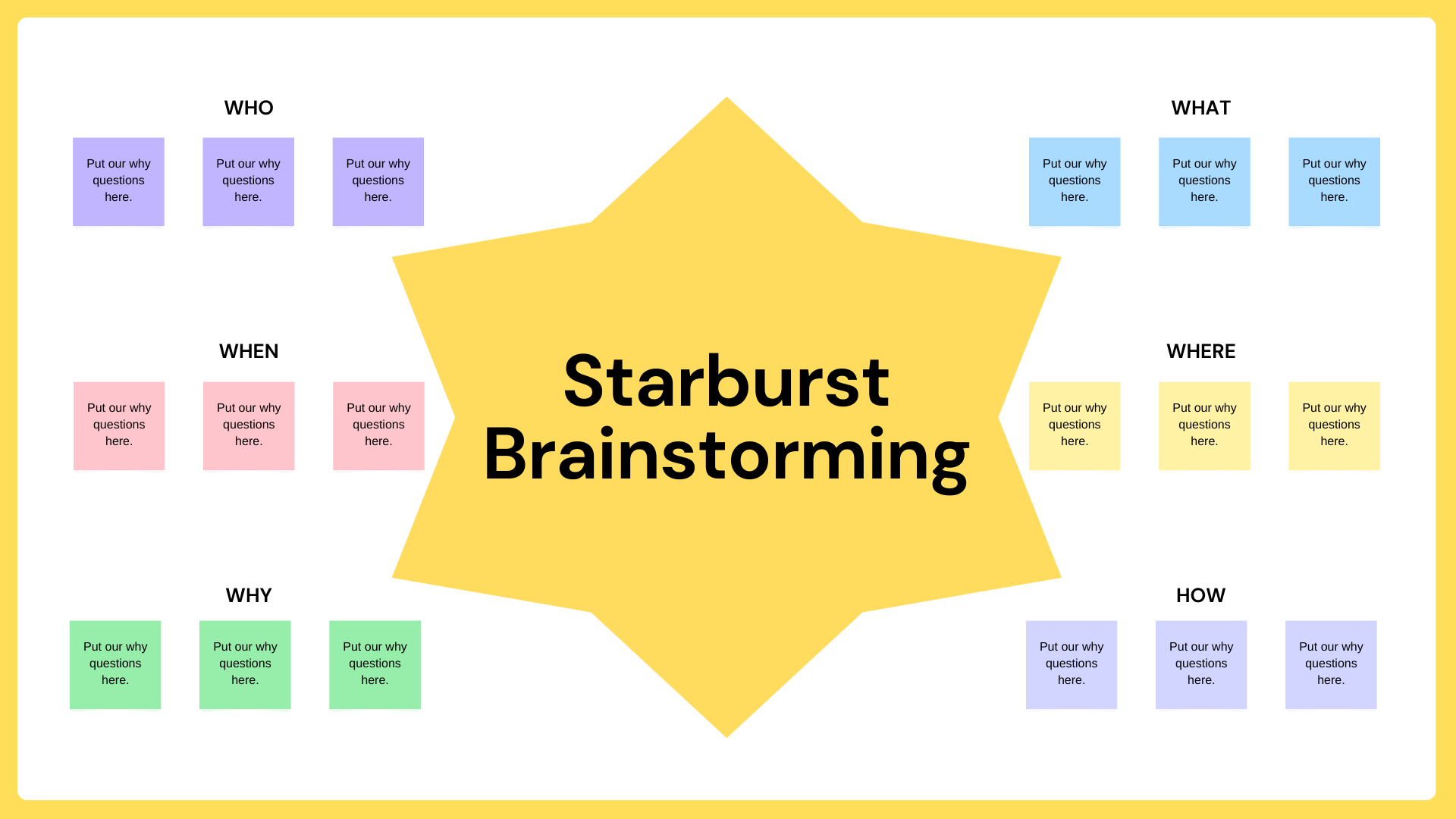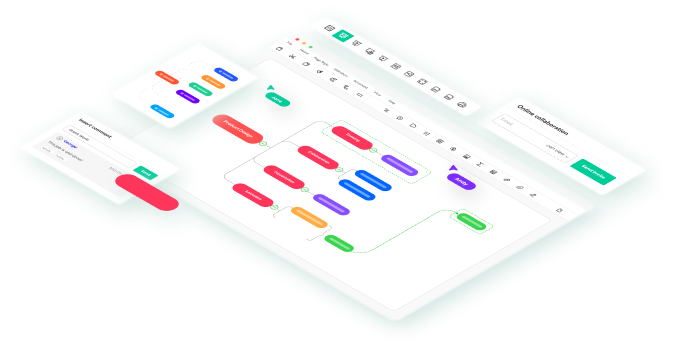
Yesterday, your team manager said, let us launch a new camping vehicle, and the entire team is now sharing ideas on how to make it boxy, modern, and compact. However, before you jump into the design details, it is essential to address the key details like purpose, need, and marketing strategy.
Here comes starbursting brainstorming. This technique focuses on asking the right questions. It helps you innovate, solve problems, and satisfy the customer's interest when done correctly. But is there a correct starbursting way? Though there is no one proper method, a shared workspace with pre-built starbursting examples like EdrawMind may be a good start.
So, let us learn what starbursting is, why it is better, and how to do it effectively.
In this article
What is Starbursting

Starbursting is a structured brainstorming technique that revolves around asking all the possible questions about the topic rather than seeking instant responses. In this method, the team plans a meeting to explore six question categories, including what, who, when, where, how, and why.
A typical starbursting brainstorming session involves a six-point star-shaped diagram with the main idea in the center and each question category represented by the star's axis. As team members propose questions, each axis expands.
Typically, starbursting is used to make decisions, generate ideas, develop a product, and solve existing problems. It allows teams to differentiate the right questions and answer them strategically to filter the fruitful solutions.
# Benefits of Starbursting
Here are a few reasons why starbursting may prove beneficial.
- It is strategically planned and takes less time than regular brainstorming.
- During starbursting, teams explore all possible solutions or ideas regarding a topic. Hence, there are minimum problems or drawbacks during the development stage.
- It leads to deeper questions that are usually not asked during a non-focused brainstorming session.
- It helps identify potential problems and find their effective solutions.
How to Use the Starbursting Brainstorming Method
Organizing a starbursting meeting is like any other brainstorming session. It requires time management, team collaboration, and a well-crafted plan. Here is how you can arrange a productive starbursting brainstorming meeting.
Step 1: Make a Six-Point Star
First, outline a six-point star with an empty center. You can use a whiteboard or an editable template for the canvas, depending on whether it is a physical or virtual meeting. But before that, decide whether the team will share one star or each member will have separate stars.
Step 2: Add Question Groups
Once you have the outline, add the problem, central idea, or product name in the center. Similarly, mention the six question categories (What, Where, Who, Why, When, and How) at each point of the star.
Step 3: Set up a Moderator
The key to any successful brainstorming session is a moderator. So, appoint a person to facilitate the meeting. He/she will be managing time, keeping members on track, and preventing distractive discussions. Moreover, the moderator will determine whether the asked questions are relevant.
Step 4: Brainstorm the Questions
Now, start brainstorming questions for each category. For instance, in the What category, questions will look like;
- What is the cost of the project?
- What is the right marketing strategy?
Ask your team to come up with as many questions as they can for each category. A great way to brainstorm questions effectively is to distribute the categories among the team. So, divide your team into six small groups, assign one category to each group, and ask them to brainstorm questions.
Step 5: Answer the Questions
The final step is answering the decided questions. You may schedule another meeting for answers or take a break between the two meetings in order to start fresh. Finally, answer the questions and find a solid ground for further discussions. Filter the best ideas and assign tasks.
Tips for Maximizing the Effectiveness of Starbursting
Cross-talks and dominating individuals can make starbursting sessions challenging to organize. However, you can get rid of this by implementing these useful tips.
1. Appoint a Moderator
Getting distracted during an open-ended starbursting session is not unusual. However, it may impact the results. Hence, appointing a facilitator who can allocate a specific time and prevent cross-talking is better.
2. Arrange Extended Sessions
Generating on-the-spot ideas can be challenging, given some people easily get socially pressured. Hence, you can accommodate such people by selecting editable starbursting templates so they can add questions at their convenience over a few days.
3. Record Ideas
A digital brainstorming tool that records your revision history and promotes team collaboration can ease the starbursting session preparations. EdrawMind Online might be a better substitute here, as it has free brainstorming templates and a real-time collaborative workspace.
Example of Successful Starbursting Session
This six-point starbursting brainstorming example for the launch of a new app can help you figure out the intended audience, product demand, development process, revenue generation, and marketing.
By exploring possible questions and answering them with this example, you can filter effective solutions for the above-mentioned problem areas. Moreover, you can get creative inspiration from the available questions or edit them according to your brainstormed responses.
A good way to utilize this starbursting example is by inviting team members to make changes and allocating at least a week for this exercise. Once done, you can note down the questions and follow up on the responses.
Conclusion
Whether you are solving a problem, planning an app launch, or developing a new item, including starbursting brainstorming in the process can do wonders. It helps you explore possible ways to improve, market, and develop a new product.
However, it is more than just gathering people and arranging a non-focused brainstorming session. In this case, success lies in preparation. The better you plan, the more results starbursting will yield.
An excellent way to prepare a systemic starbursting session is on a digital space like EdrawMind, where you can access free templates, gather feedback, revise changes, and collaborate with the team.





 below.
below.  below.
below. 